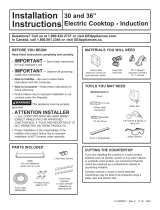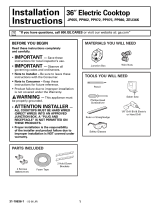
8
31-11025-1
Instrucciones de instalación
INSTALACIÓN³&21(;,21(6(/e&75,&$6
INSTRUCCIONES PARA DESCARGA A TIERRA:
El cable de descarga a tierra en el conducto se
conecta al armazón de la estufa. A partir del 1 de
enero de 1996, el Código Nacional sobre Electricidad
no permitirá la descarga a tierra a través de cables
neutrales. Si se usa en una construcción nueva
después del 1 de enero de 1996 o bien en una casa
rodante, vehículo recreativo, o bien si los códigos
locales no permiten la descarga a tierra a través de
cables blancos neutrales, sujete el cable de descarga
a tierra del aparato (verde o cobre) al conductor de
descarga a tierra de la residencia (verde o cobre) de
acuerdo con los códigos locales. Cuando conecte a
un circuito derivado de 3 conductores, si lo permiten
los códigos locales, conecte el cable del conector
de descarga a tierra al circuito derivado neutral (de
color gris o blanco).
IMPORTANTE: Si la estufa se va
a instalar en un mostrador sin salida (uno sin
abertura del gabinete inferior), las conexiones del
cableado deberán realizarse antes de colocar la
estufa en el área cortada.
1
LISTA DE VERIFICACIÓN PREVIA
A
Retire toda la película protectora, si la hay,
y las calcomanías.
B
Verifique que todos los cables estén fijos y que
no estén torcidos o en contacto con partes
móviles.
C
Verifique el nivel del aparato.
D
Verifique que la estufa esté descargada
a tierra correctamente.
LISTAS DE VERIFICACIÓN
NOTA PARA EL ELECTRICISTA:
Los cables de corriente incluidos con este
aparato cuentan con la aprobación de UL para
conexiones a cableado doméstico de mayor
calibre. El aislante de estos cables se califica a
temperaturas más elevadas que las del cableado
doméstico. La capacidad de carga actual de
un conductor depende del calibre del cable y
también de la calificación de la temperatura del
aislante alrededor del cable.
NOTA: CABLEADO DE ALUMINIO
• ADVERTENCIA:
LA CONEXIÓN INADECUADA DEL CABLEADO
DOMÉSTICO DE ALUMINIO A LOS CABLES DE
COBRE PUEDE RESULTAR EN UN PROBLEMA
GRAVE.
• Una los cables de cobre a los de aluminio con
conectores especiales diseñados y aprobados
por UL para unir cables de cobre a cables de
aluminio; asimismo, siga cuidadosamente las
recomendaciones del fabricante al manipular
el conector.
NOTA: El uso de los cables, la ubicación
y alojamiento de empalmes, etc., deben
realizarse correctamente y de acuerdo con los
códigos locales.
2
LISTA DE VERIFICACIÓN
DE OPERACIÓN
A
Retire todos los objetos que se encuentren
sobre la superficie de la estufa.
B
Encienda la toma de corriente de la estufa
(consulte su Manual del propietario). Verifique
que todas las hornillas de la superficie
funcionen correctamente.
C
Verifique que el cortacircuitos no esté
desactivado o que se haya fundido el fusible
de su hogar.
D
Verifique que el conducto esté conectado
correctamente a la caja de conexiones.


















